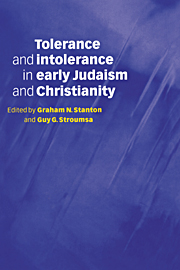Book contents
- Frontmatter
- Contents
- List of contributors
- List of abbreviations
- Introduction
- 1 Intolerance and martyrdom: from Socrates to Rabbi ‘Aqiva
- 2 The other in 1 and 2 Maccabees
- 3 The pursuit of the millennium in early Judaism
- 4 Conservative revolution? The intolerant innovations of Qumran
- 5 Who was considered an apostate in the Jewish Diaspora?
- 6 Why did Paul persecute the church?
- 7 Paul and the limits of tolerance
- 8 Philo's views on paganism
- 9 Coexisting with the enemy: Jews and pagans in the Mishnah
- 10 Tertullian on idolatry and the limits of tolerance
- 11 The threefold Christian anti-Judaism
- 12 The intertextual polemic of the Markan vineyard parable
- 13 Jews and Jewish Christians in the land of Israel at the time of the Bar Kochba war, with special reference to the Apocalypse of Peter
- 14 The Nazoreans: living at the boundary of Judaism and Christianity
- 15 Justin Martyr's Dialogue with Trypho: group boundaries, ‘proselytes’ and ‘God-fearers’
- 16 Accusations of Jewish persecution in early Christian sources, with particular reference to Justin Martyr and the Martyrdom of Polycarp
- 17 Early Christians on synagogue prayer and imprecation
- 18 Messianism, Torah and early Christian tradition
- 19 Jewish and Christian public ethics in the early Roman Empire
- Postscript: the future of intolerance
- General bibliography
- Index
19 - Jewish and Christian public ethics in the early Roman Empire
Published online by Cambridge University Press: 08 March 2010
- Frontmatter
- Contents
- List of contributors
- List of abbreviations
- Introduction
- 1 Intolerance and martyrdom: from Socrates to Rabbi ‘Aqiva
- 2 The other in 1 and 2 Maccabees
- 3 The pursuit of the millennium in early Judaism
- 4 Conservative revolution? The intolerant innovations of Qumran
- 5 Who was considered an apostate in the Jewish Diaspora?
- 6 Why did Paul persecute the church?
- 7 Paul and the limits of tolerance
- 8 Philo's views on paganism
- 9 Coexisting with the enemy: Jews and pagans in the Mishnah
- 10 Tertullian on idolatry and the limits of tolerance
- 11 The threefold Christian anti-Judaism
- 12 The intertextual polemic of the Markan vineyard parable
- 13 Jews and Jewish Christians in the land of Israel at the time of the Bar Kochba war, with special reference to the Apocalypse of Peter
- 14 The Nazoreans: living at the boundary of Judaism and Christianity
- 15 Justin Martyr's Dialogue with Trypho: group boundaries, ‘proselytes’ and ‘God-fearers’
- 16 Accusations of Jewish persecution in early Christian sources, with particular reference to Justin Martyr and the Martyrdom of Polycarp
- 17 Early Christians on synagogue prayer and imprecation
- 18 Messianism, Torah and early Christian tradition
- 19 Jewish and Christian public ethics in the early Roman Empire
- Postscript: the future of intolerance
- General bibliography
- Index
Summary
Among the issues defining the limits of corporate tolerance in Christianity and Judaism are matters of morality and lifestyle. In this context it can be quite revealing to examine the distinctive characteristics of how Jews and Christians explained and justified that morality in public discourse. By ‘public’ discourse I mean that which is carried on in terms that would be relevant to outsiders, within the early imperial environment of pluralistic paganism. Such public dialogue may be real or only notional, just as apologetics may be internal as well as external dialogue; indeed the difference between internal and external need not always be clear. Ethics for present purposes is ‘public’ regardless of whether its communication to outsiders is intended to be persuasive, reassuring, or straightforwardly explanatory.
Before going on to look at some of the substantive questions on this subject, it is worth considering briefly the social Sitz im Leben of such public discourse. It must be admitted from the outset that for both Judaism and Christianity, deliberate thought about public ethics probably always remained a fringe activity on the part of a social and intellectual elite. What is more, Jewish life and practice at least in the larger centres like Palestine, Alexandria or Antioch was a sufficiently established reality on the ground to make popular preoccupation with this subject the exception rather than the rule.
However, it would be erroneous to conclude that the subject of public moral discourse is therefore only of marginal interest for the study of early Jewish and Christian attitudes to tolerance. There are in fact a number of points worth raising in reply.
- Type
- Chapter
- Information
- Tolerance and Intolerance in Early Judaism and Christianity , pp. 342 - 355Publisher: Cambridge University PressPrint publication year: 1998



